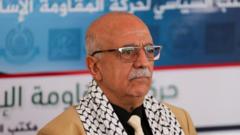Did Israeli Strikes Kill the Houthi Prime Minister?

Published: 2025-08-30 16:45:13 | Category: world
This week, Yemen's Houthi rebel movement confirmed the death of its self-proclaimed Prime Minister, Ahmed Ghaleb Nasser al-Rahawi, due to Israeli air strikes on the capital, Sanaa. The air strikes, carried out by the Israel Defense Forces (IDF), also reportedly resulted in the deaths of several other senior Houthi officials. This escalation comes amid a broader context of conflict in the region, particularly following the ongoing war between Israel and Hamas.
Last updated: 27 October 2023 (BST)
Key Takeaways
- Ahmed Ghaleb Nasser al-Rahawi was confirmed dead in Israeli air strikes on Sanaa.
- Other senior Houthi officials were reportedly killed or injured in the strikes.
- The Houthis have been active in launching attacks against Israel and maritime targets in response to the conflict in Gaza.
- Israel has conducted air strikes targeting Houthi positions in Yemen since the beginning of the latest conflict.
- Rahawi had been in office since August 2024, and his deputy will now take over.
The Context of the Conflict
The Houthi movement has been a significant force in Yemen since they ousted the internationally recognised government in 2014, leading to a devastating civil war. Backed by Iran, the Houthis control large parts of north-western Yemen, including the capital Sanaa. The group’s leadership has claimed that their military actions, including missile launches against Israel and attacks on commercial shipping, are in solidarity with the Palestinian cause amidst the ongoing conflict in Gaza.
Details of the Air Strikes
On Thursday, the IDF targeted what it described as a Houthi "military target" in Sanaa. This air strike is part of a broader pattern of Israeli military engagement in the region, which has intensified since the resurgence of hostilities between Israel and Hamas. The Houthis reported that Rahawi was killed alongside his foreign minister and other ministers responsible for justice, youth and sports, social affairs, and labour. These reports highlight the impactful loss of leadership within the Houthi movement.
The Human Cost of Conflict
The air strikes have not only resulted in the death of high-ranking officials but also left several others injured. The office of Mahdi Al-Mashat, the Houthis' president, announced that multiple ministers sustained moderate to serious injuries in the attack. This loss of senior leadership could have implications for the group's operational strategy and cohesion, particularly as they continue to face external pressures from Israel and its allies.
Implications for the Houthi Movement
In the wake of Rahawi's death, Muhammad Ahmed Miftah, the Houthi deputy prime minister, is expected to assume leadership. The transition of power within the Houthi ranks could influence their military and political strategies moving forward. Given the escalating tensions and the ongoing conflict in the region, the Houthis' response to this loss will be closely monitored.
Wider Regional Reactions
The ongoing conflict in Yemen is not occurring in isolation. The broader Middle Eastern landscape is marked by complex alliances and hostilities. The Houthis’ missile attacks on Israel and their threats to commercial vessels in the Red Sea and Gulf of Aden are seen as acts of defiance against Israeli actions in Gaza. These developments could further complicate diplomatic efforts and heighten military tensions in the region.
What’s Next for Yemen?
With the Houthi leadership facing significant challenges following the air strikes, the future of Yemen remains uncertain. The Houthis' continued military capabilities and their willingness to engage in retaliatory actions will be critical in determining the next phase of conflict in the region. Moreover, the potential for further Israeli air strikes may escalate tensions further.
The International Community’s Role
The international community has been largely silent on the recent escalation of violence between Israel and the Houthis. However, humanitarian concerns are mounting as the conflict in Yemen continues to exacerbate an already dire situation, with millions of citizens in need of aid. The need for diplomatic intervention and support for peace talks is more pressing than ever as the cycle of violence continues.
FAQs
Who was Ahmed Ghaleb Nasser al-Rahawi?
Ahmed Ghaleb Nasser al-Rahawi was the self-proclaimed Prime Minister of the Houthi movement in Yemen, having held the position since August 2024. He was reportedly killed in recent Israeli air strikes in Sanaa.
What led to the Israeli air strikes in Yemen?
The Israeli air strikes were part of ongoing military operations aimed at targeting Houthi military capabilities, particularly in response to missile attacks launched by the Houthis against Israel amidst the Gaza conflict.
What are the implications of Rahawi's death for the Houthis?
Rahawi's death could destabilise the Houthi leadership and affect their military strategy. His deputy, Muhammad Ahmed Miftah, has taken over, but the loss of key figures may impact their operational effectiveness and unity.
How has the conflict in Yemen affected civilians?
The civil war in Yemen has led to a humanitarian crisis, with millions facing food insecurity, lack of healthcare, and displacement due to ongoing violence and military actions from both local and external forces.
What actions have the Houthis taken against Israel?
The Houthis have launched missiles at Israel and threatened maritime targets in the Red Sea, claiming these actions are in solidarity with the Palestinian people amid the escalating conflict in Gaza.
As the situation evolves, it is crucial to monitor developments in Yemen and the broader Middle East. The complexities of the conflict pose significant challenges for peace and stability in the region. #YemenConflict #HouthiMovement #MiddleEastTensions



